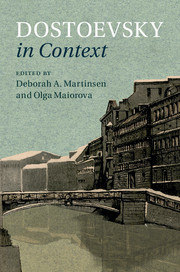Book contents
- Frontmatter
- Contents
- List of illustrations
- Notes on contributors
- Acknowledgments
- Note on citation, transliteration, glossary, and dates
- Chronology
- 1 Introduction: the many worlds of Dostoevsky
- PART I SOCIAL, HISTORICAL, AND CULTURAL CONTEXTS
- PART II LITERATURE, JOURNALISM, AND LANGUAGES
- 25 Modern print culture
- 26 Realism
- 27 Dostoevsky: translator and translated
- 28 Travel and travel writing
- 29 Folklore
- 30 Foreign languages
- 31 Theater
- 32 Dostoevsky's journalism and fiction
- 33 Dostoevsky's journalism in the 1860s
- 34 Dostoevsky's journalism in the 1870s
- 35 Censorship
- Glossary
- Further reading
- Index
- References
34 - Dostoevsky's journalism in the 1870s
from PART II - LITERATURE, JOURNALISM, AND LANGUAGES
Published online by Cambridge University Press: 18 December 2015
- Frontmatter
- Contents
- List of illustrations
- Notes on contributors
- Acknowledgments
- Note on citation, transliteration, glossary, and dates
- Chronology
- 1 Introduction: the many worlds of Dostoevsky
- PART I SOCIAL, HISTORICAL, AND CULTURAL CONTEXTS
- PART II LITERATURE, JOURNALISM, AND LANGUAGES
- 25 Modern print culture
- 26 Realism
- 27 Dostoevsky: translator and translated
- 28 Travel and travel writing
- 29 Folklore
- 30 Foreign languages
- 31 Theater
- 32 Dostoevsky's journalism and fiction
- 33 Dostoevsky's journalism in the 1860s
- 34 Dostoevsky's journalism in the 1870s
- 35 Censorship
- Glossary
- Further reading
- Index
- References
Summary
During the 1870s, Dostoevsky was involved in two major journalistic ventures. In late 1872, he became editor of Prince Vladimir Meshchersky's conservative weekly, Grazhdanin (The Citizen). From January 1, 1873, to April 22, 1874, he edited sixty-five issues and wrote two regular columns called “Diary of a Writer” and “Foreign Affairs.” Two years later he founded his own monthly periodical, also called Dnevnik pisatelya (Diary of a Writer). This monojournal, for which he served as publisher, editor, and sole contributor, ran for twenty-two issues from 1876 to 1877, was resurrected for a single issue in 1880, and came out once again the month before his death in 1881. Because it engaged with the burning issues of the day and expressed patriotic zeal as the Russo-Turkish war began in 1877, it attracted large numbers of subscribers. Moreover, because The Citizen and Diary of a Writer served as creative laboratories within which Dostoevsky formulated his varied literary responses to the challenges of modernization, both journals provide unique insights into the social, ideological, and aesthetic preoccupations that shaped the novels of his last decade.
After returning from Siberian exile in 1859, Dostoevsky founded and edited the journals Vremya (Time, 1861–3) and Epokha (Epoch, 1864–5) together with his brother Mikhail. Although he did not edit a journal between 1865 and 1873, Dostoevsky wrote novels to be published serially in thick journals*. Like his fellow heavyweight novelists, Dostoevsky was normally granted a generous amount of space (serialized installments could range in length from thirty pages to one or two hundred) and most of his novels up to The Brothers Karamazov (1879–80) were serialized within the twelve annual issues of the host journal.
When Dostoevsky returned to editorial duties in 1873, the journalistic scene had changed dramatically. The intelligentsia's* optimism in the early 1860s about the Great Reforms, which included the emancipation of the serfs (1861), the judicial reform (1864), the introduction of local self-government or zemstvo* (1864), and a relaxation of censorship regulations (1865), had given way to bitter disillusionment which was reflected on the pages of journals and newspapers on both left and right. Discontent with the impact of the Great Reforms was evident at all levels of society, and in 1871, sparked by the ten-year anniversary of the emancipation, the Russian press, benefiting from the relaxation of censorship, reflected this discontent.
- Type
- Chapter
- Information
- Dostoevsky in Context , pp. 288 - 294Publisher: Cambridge University PressPrint publication year: 2016



